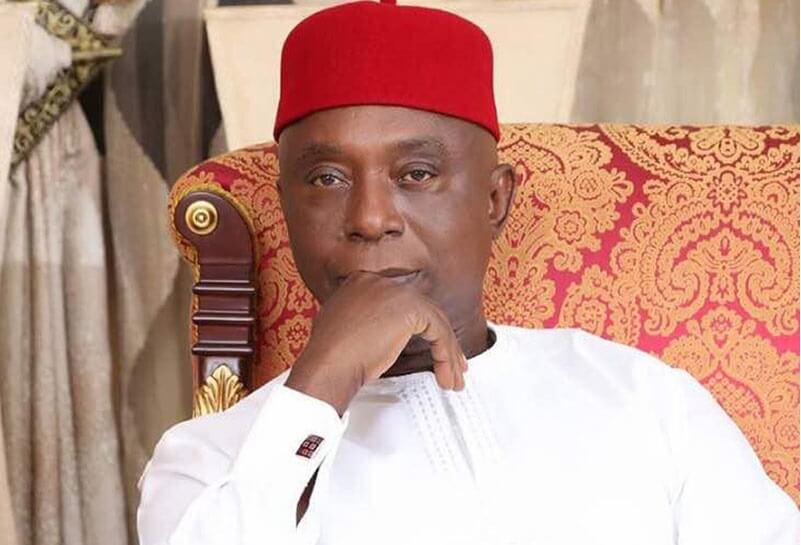Why Tinubu Sacked Uju-Ken, 5 Other Ministers
…Appoints Bianca Ojukwu, Six Others As Ministers
…Merges Ministries, Renames N’Delta Ministry
…Edwin Clarke Rejects Renaming Of Ministry
President Bola Tinubu on Wednesday approved a major cabinet reshuffle that saw the dismissal of six ministers and nomination of seven new ones, including Bianca Odumegwu-Ojukwu, widow of the former Biafran leader.
The restructuring, ratified during the Federal Executive Council (FEC) meeting presided over by President Tinubu, saw the exit of Uju-Ken Ohanenye as Minister of Women Affairs, Lola Ade-John as Minister of Tourism, Prof. Tahir Mamman as Minister of Education, Abdullahi Gwarzo as Minister of State for Housing and Urban Development, and Jamila Ibrahim as Minister of Youth Development.
Among the notable appointments, Dr. Nentawe Yilwatda was named to replace the suspended Minister of Humanitarian Affairs and Poverty Alleviation, Betta Chimaobim Edu.
The president also nominated Maigari Dingyadi as the Minister of Labour and Employment, Jumoke Oduwole as the Minister of Industry, Trade and Investment, Idi Maiha as Minister for the newly created Livestock Development Ministry, Yusuf Ata as the Minister of State, Housing and Urban Development, and Suwaiba Ahmad as Minister of State Education.
Bianca Ojukwu will assume the position of Minister of State for Foreign Affairs. All the appointments are subject to confirmation of the Senate.
FEC also approved renaming of the Ministry of Niger Delta Development as the Ministry of Regional Development, which will now oversee the Niger Delta, South East, North East, and North West regional development commissions.
The move was, however, met with criticism from elder statesman, Chief Edwin Clarke.
The restructuring further saw the dissolution of the Ministry of Sports Development, whose functions have been transferred to the National Sports Commission in efforts “to develop a vibrant sports economy.”
FEC also approved the merger of the Ministry of Tourism with the Ministry of Arts and Culture, which will now be known as the Ministry of Art, Culture, Tourism and Creative Economy.
Sources close to the presidency have indicated that the cabinet reshuffle was informed by the need to strengthen the administration’s efforts to implement President Tinubu’s reform agenda.
“The general concern among some of his aides, friends, and even the public is that the cabinet can be far better than this,” revealed a source who spoke on condition of anonymity.
The shake-up comes amid growing pressure on the administration to deliver on its reforms and promises.
In a recent report by the Financial Times, Dele Olojede, the Pulitzer Prize winner, said President Tinubu had appointed a “wholly unprepared” team incapable of delivering an economic reset.
“I just don’t have confidence in this extraordinarily weak, slapdash cabinet that seems to be based principally on political favours,” he had said.
In a follow up editorial, the British daily newspaper wrote: “With a few exceptions, his (Tinubu’s) cabinet is full of lightweights who owe their jobs to political patronage, not to expertise,” adding “Technocratic talent exists in abundance. It must be marshalled.”
Scorecard Of Sacked Ministers
TAHIR MAMMAN
The tenure of the outgoing education minister, Prof. Tahir Mamman, saw the introduction of 18-year age limit for admission seekers into Nigerian institutions. The policy sparked controversy from various quarters in the country.
Mamman, who was the Vice Chancellor of Baze University, Abuja, before his appointment by the Tinubu-led administration in 2023, faced opposition when he announced at the 2024 Policy Meeting of the Joint Admissions and Matriculation Board.
The former Director-General of the Nigerian Law School, had also announced plans to review the merger of federal technical colleges and science schools to unbundle them and enhance vocational training.
Mamman expressed displeasure over the merging of technical colleges with colleges of science, saying that it eroded the gains of establishing technical colleges across the country.
Mamman’s removal came two weeks after the unveiling of the new curriculum for basic education in Nigeria which was scheduled to commence January 2025.
Under the new curriculum, pupils in basic schools would be required to acquire at least two skills.
The skills include vocations such as plumbing, tiling, hairstyling, floor works, POP and solar installation are included in the new curriculum.
While giving his account of stewardship in one year, Mamman stated that so far, a total of four million out of school children have been enrolled into schools nationwide with the Federal Capital Territory registering not less than 20,000 children.
LOLA ADE-JOHN
The former Minister of Tourism was sworn into office on August 21, 2023, after being appointed by President Bola Tinubu. Her swearing-in ceremony made headlines when she knelt before the president after signing the oath of service.
However, since then, nothing much was heard about her ministry’s activities.
Despite her impressive background as a former banker and IT expert, stakeholders claim that Ade-John’s responsibilities were overshadowed by the Ministry of Art, Culture, and Creative Economy.
The minister, while celebrating her one year in office, said despite numerous challenges, the ministry made substantial strides in enhancing and promoting tourism across the nation.
She had listed organising tours to several key historical and cultural sites such as the Badagry Slave Route, Ikogosi Warm Springs, King Kosoko Museum, and Obudu Mountain Resort, among her achievements.
According to Ade-John, the ministry’s slim budget had prevented it from driving many tourism projects on its table.
BETTA EDU
The former Minister of Humanitarian Affairs and Poverty Alleviation was suspended over allegations a suspicious financial transaction.
Documents had leaked to the public showing that Edu ordered the payment of N585.2m into the private bank account of a civil servant, who is the accountant in charge of Grants for vulnerable Nigerians under the family Federal Government’s social intervention programmes.
The leaked memo showed that Edu in December 2023, requested Oluwatoyin Madein, the Accountant General of the Federation, to transfer the money from the account of the National Social Investment Office to the private account of Bridget Oniyelu, the accountant of a federal government poverty intervention project called Grants for Vulnerable Groups.
Meanwhile, THE WHISTLER recalls that during a three-day retreat held for ministers, presidential aides , permanent secretaries and top government functionaries in November, President Tinubu had warned that any minister who fails to deliver on his or her job would be sacked.
“If you are performing, nothing to fear, if you miss the objective we review, if you don’t perform, you leave us… Don’t be a clog in the wheel of Nigeria’s progress,” the president had stated.
Tinubu had announced the establishment of a ‘Results Delivery Unit’ to be headed by Hadiza Bala Usman through which ministers, permanent secretaries and the president would assess themselves from time to time.
In order to enable Nigerians to hold him and his ministers accountable for his administration’s promises, he also directed the reactivation of the presidential projects delivery tracker through which the public could monitor the progress of projects across the nation in real time.
Why Tinubu Sacked Uju-Ken, 5 Other Ministers is first published on The Whistler Newspaper





